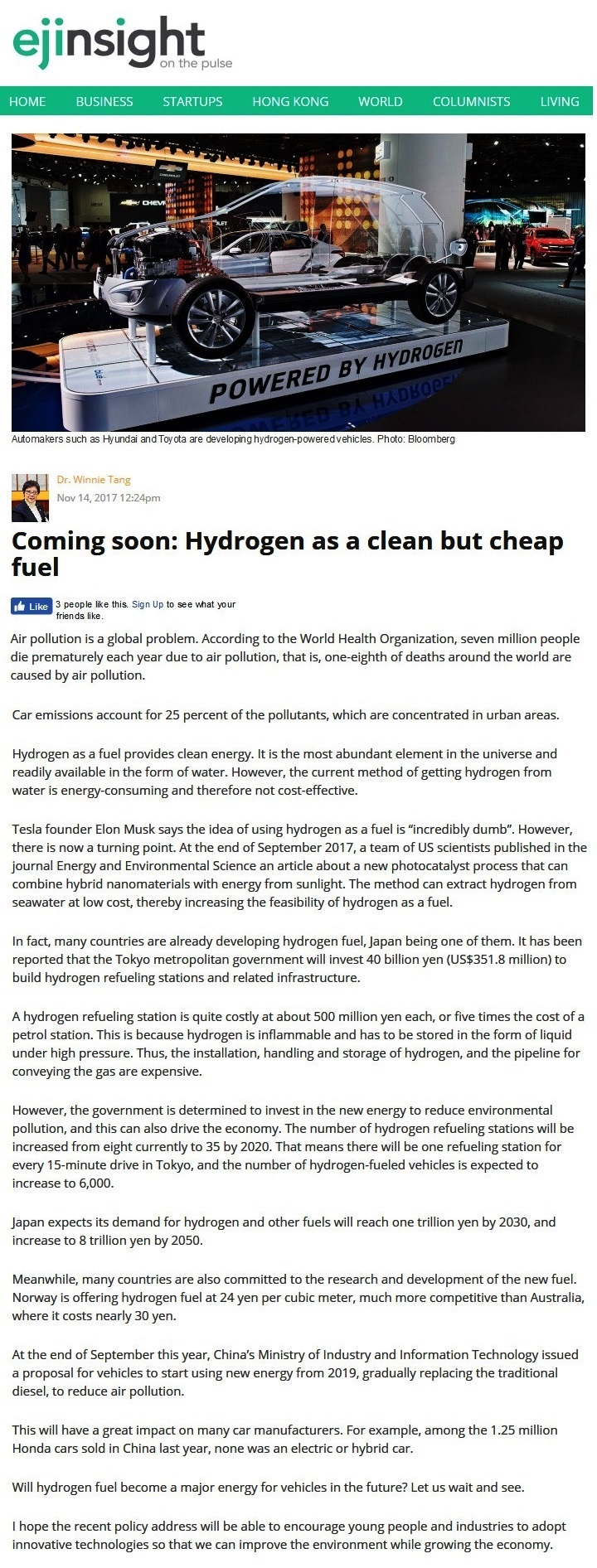網上版請按此

Coming soon: Hydrogen as a clean but cheap fuel
Air pollution is a global problem. According to the World Health Organization, seven million people die prematurely each year due to air pollution, that is, one-eighth of deaths around the world are caused by air pollution.
Car emissions account for 25 percent of the pollutants, which are concentrated in urban areas.
Hydrogen as a fuel provides clean energy. It is the most abundant element in the universe and readily available in the form of water. However, the current method of getting hydrogen from water is energy-consuming and therefore not cost-effective.
Tesla founder Elon Musk says the idea of using hydrogen as a fuel is "incredibly dumb". However, there is now a turning point. At the end of September 2017, a team of US scientists published in the journal Energy and Environmental Science an article about a new photocatalyst process that can combine hybrid nanomaterials with energy from sunlight. The method can extract hydrogen from seawater at low cost, thereby increasing the feasibility of hydrogen as a fuel.
In fact, many countries are already developing hydrogen fuel, Japan being one of them. It has been reported that the Tokyo metropolitan government will invest 40 billion yen (US$351.8 million) to build hydrogen refueling stations and related infrastructure.
A hydrogen refueling station is quite costly at about 500 million yen each, or five times the cost of a petrol station. This is because hydrogen is inflammable and has to be stored in the form of liquid under high pressure. Thus, the installation, handling and storage of hydrogen, and the pipeline for conveying the gas are expensive.
However, the government is determined to invest in the new energy to reduce environmental pollution, and this can also drive the economy. The number of hydrogen refueling stations will be increased from eight currently to 35 by 2020. That means there will be one refueling station for every 15-minute drive in Tokyo, and the number of hydrogen-fueled vehicles is expected to increase to 6,000.
Japan expects its demand for hydrogen and other fuels will reach one trillion yen by 2030, and increase to 8 trillion yen by 2050.
Meanwhile, many countries are also committed to the research and development of the new fuel. Norway is offering hydrogen fuel at 24 yen per cubic meter, much more competitive than Australia, where it costs nearly 30 yen.
At the end of September this year, China's Ministry of Industry and Information Technology issued a proposal for vehicles to start using new energy from 2019, gradually replacing the traditional diesel, to reduce air pollution.
This will have a great impact on many car manufacturers. For example, among the 1.25 million Honda cars sold in China last year, none was an electric or hybrid car.
Will hydrogen fuel become a major energy for vehicles in the future? Let us wait and see.
I hope the recent policy address will be able to encourage young people and industries to adopt innovative technologies so that we can improve the environment while growing the economy.
Dr. Winnie Tang
Honorary Professor, Department of Computer Science, The University of Hong Kong